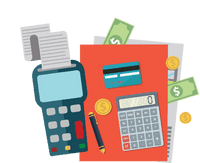If you’re buying a home, getting approved for a mortgage is one of the most crucial steps and requires a lot of preparation. In order to qualify, you’ll have to prove to your lender that you can afford the amount you need to borrow and meet their qualification standards. When you start the application process, key information and documents are required to measure your financial stability. If you’re a newcomer to Canada or a first-time home buyer, here is a simple overview of everything you need to consider if you’re looking to get approved for a mortgage.
1. How much do you need for a down payment?
Minimum down payments in Canada range from 5%-20%. The size of your down payment will also determine the size of your mortgage and can influence your likelihood of getting approved.
What are the different types of down payments?
The key three categories are:
High Ratio: down payment between 5%-19.99% for a home below $1 million (CMHC insurance is needed - which is a cost that ranges between 2.8-4% of your mortgage. This cost can be spent over the full 25 year amortization schedule)
Conventional Insurable: down payment is 20% for a home below $1 million (no payment for CMHC insurance)
Conventional Uninsurable: down payment is at least 20% for a home $1 million or more (no payment for CMHC insurance)
For down payments between 5% and 19.99% on a home under $1 million, you are required to purchase CMHC mortgage insurance.
For example, if you’re looking to purchase a $500,000 home and want to make a down payment of 8% ($40,000), your mortgage size will be $460,000. With a CMHC premium of 4%, you will be required to pay $18,400 in CMHC insurance. Don’t worry, the cost is amortized over your full mortgage length and included as part of your mortgage (i.e., 25 years).
2. Government Incentives
First-Time Home Buyers
As a first-time home buyer, you may be eligible to apply for government incentives that help you make a down payment. If you’re eligible and choose to participate, you will need to provide proof and disclose this to your lender.
Land-Transfer Tax Rebate: This is one of the most valuable programs for first-time home buyers. Depending on the province or city you are buying in, there are different amounts that you can qualify for. For example, if you’re buying in Ontario, you could claim up to $4,000 as a rebate.
The Home Buyer’s Plan: This allows first-time home buyers to withdraw up to $35,000 tax-free from their Registered Retirement Savings Plans (RRSPs) to buy or build a qualifying home. If you’re purchasing a home with another person and they are eligible, you can withdraw up to $70,000 tax-free from your RRSP to make a down payment.
The First-Time Home Buyer Incentive Program: This is a shared equity program that helps first-time buyers purchase their first home. It offers 5% on the purchase price of resale properties and 10% on the purchase price for new builds to put toward a down payment.
“Newcomers to Canada” Housing Program
If you’re new to Canada, the CMHC "Newcomers to Canada" program helps borrowers with permanent and non-permanent residency status to make a down payment on a home with a value of under $1 million. This program gives newcomers access to CMHC mortgage loan insurance products including home owner loans insurance and small rental loans insurance. To learn more, check out our comprehensive guide to understand the Newcomers to Canada housing program.
3. Key Documentation
To complete your mortgage application, you will need to collect key documents and forms to validate your employment, measure your level of risk and determine your eligibility for approval. This includes the following:
A letter of employment
A copy of your pay stub
Your T4 documents (last two years)
A description of your current job position
A copy of your tax returns
A notice of assessment
Government-issued photo ID
Bank and financial statements
5. Credit Score
A credit score is a number given to you based on your repayment history with credit facilities such as credit cards, lines of credit and auto loans. When applying for a mortgage, you will need to provide a credit report from a credit reporting agency. Typically, a credit score above 650 is the minimum an ideal benchmark for getting approved for a mortgage. To increase your chances of getting approved, a credit score above 700 is beneficial.
6. How does my debt-and-income ratio affect my mortgage?
Your debt-to-income ratio is a calculation that indicates how much debt you can manage based on your current income on a monthly basis. This ratio is an indicator lenders use to see if you’ll be able to make your mortgage payments. Some factors that can impact your debt-to-income ratio include outstanding car loans/leases, student loans and credit card payments.
If you’re looking to qualify for a mortgage, the best thing you can do is pay off your debt consistently and keep your debt-to-income ratio as low as possible. The maximum levels lenders look for a 39% debt-to-income, not including the mortgage and 44% including the mortgage payment and property taxes. To calculate your debt-to-income ratio, check out our affordability calculator.
7. How does buying with a co-applicant work?
Buying a home with another person is one way to make a larger down payment. It also increases your overall home affordability because another income is taken into account. Not to mention, if both applicants are first-time home buyers, you may also double up on the incentives available. This can be a friend, family member or significant other. Keep in mind that their credit score is also considered, so ensure both credit scores are in strong form. There are some lenders that allow for one credit score to be in the low 600’s if the primary applicant is above 750.
8. How does a co-signer work?
If your income is too low or your credit score does not meet your lender’s requirements, having a co-signer can increase your chances for approval. A co-signer can be a family member who authorizes to pay back your loan in the event you cannot make your payments.
9. How does a down payment gift from parent’s work?
Approximately 30% of first-time home buyers receive a monetary gift from their parents which is put towards the purchase of a home. If your down payment includes a monetary gift from a family member, you will also need to include a letter of evidence that the money was not a loan.
10. Mortgage Pre-approval
Mortgage pre-approval is another step you can take to understand your home affordability right from the start. It gives lenders the opportunity to look through your financial picture, review your credit score(s) and most importantly, approve the loan amount that you are eligible to borrow. Although pre-approval is not mandatory, it’s highly recommended because it allows buyers to set a clear budget, simplify the overall home search, shop homes that they can actually afford and lock in a mortgage for 120 days.
At Homewise, we work with over 30 banks and lenders to help you find a mortgage that best suits your unique circumstances. If you’re a newcomer to Canada or a first-time home buyer purchasing a home alone or with another person, get pre-approved for a mortgage in just five minutes HERE. One of our Mortgage Advisors will get in touch and personally assist you every step of the way.








